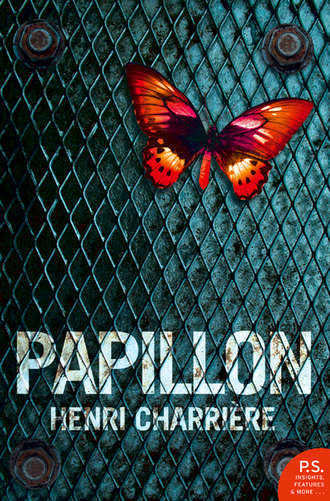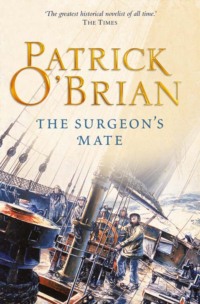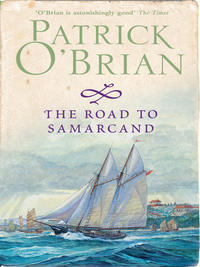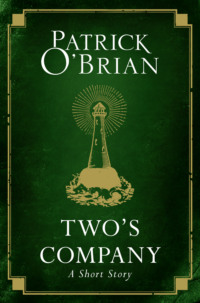
Полная версия
Papillon
Louis Dega was sitting there calmly, keeping an eye on his bar in Marseilles, where the pick of the southern underworld came every night and where the really hard guys from all over the world met one another – an international rendezvous. That was 1929 and he was a millionaire. Then one night a young, pretty, well-dressed woman turned up. She asked for Monsieur Louis Dega.
‘That’s me, Madame. What can I do for you? Come into the next room.’
‘Look, I’m Brioulet’s wife. He’s in Paris in prison for passing forged bonds. I saw him in the visiting-room at the Santé: he gave me the address of this bar and told me to come and ask you for twenty thousand francs to pay the lawyer.’
It was at this point, faced with the danger of a woman who knew his part in the business, that Dega, one of the most esteemed crooks in France, made the one remark he never should have made. ‘Listen, Madame, I don’t know your husband from Adam, and if you need money, go on the streets. You’re young and pretty and you’ll make more than you need.’ Furious, the poor woman ran out in tears. She told her husband. Brioulet was mad and the next day he told the investigating magistrate everything he knew, directly accusing Dega of being the man who produced the forged bonds. A team of the most intelligent detectives in the country got on to Dega’s trail. One month later Dega, the forger, the engraver and eleven accomplices were all arrested at the same moment in different places and put behind bars. They came up at the Seine Assizes and the trial lasted fourteen days. Each prisoner was defended by a famous lawyer. Brioulet would never take back a single word. And the result was that for a piddling twenty thousand francs and a damn-fool crack the biggest crook in France got fifteen years hard labour. There he was, ten years older than his age, and completely ruined. And this was the man I had just signed a treaty with – a life and death pact.
Maître Raymond Hubert came to see me. He wasn’t very pleased with himself. I never uttered a word of blame.
One, two, three, four, five, about turn … One, two, three, four, five, about turn. It was a good many hours now that I had been walking up and down between the door and the window of my cell. I smoked: I felt I was well in control, steady-handed and able to cope with anything at all. I promised myself not to think about revenge for the time being. Let’s leave the prosecuting counsel just there where I left him, chained to the rings in the wall, opposite me, without yet making up my mind exactly how I’d do him in.
Suddenly a shriek, a desperate, high-pitched, hideously dying shriek made its way through the door of my cell. What was it? It was like the sound of a man under torture. But this was not the Police Judiciaire. No way of telling what was going on. They turned me right up, those shrieks in the night. And what strength they must have had, to pierce through that padded door. Maybe it was a lunatic. It’s so easy to go mad in these cells where nothing ever gets through to you. I talked aloud there all by myself: I said to myself what the hell’s it got to do with you? Keep your mind on yourself, nothing but yourself and your new side-kick Dega. I bent down, straightened up and hit myself hard on the chest. It really hurt: so everything was all right – the muscles of my arms were working perfectly. And what about your legs, man? You can congratulate them, because you’ve been walking more than sixteen hours now and you’re not even beginning to feel tired.
The Chinese discovered the drop of water that falls on your head. The French discovered silence. They do away with everything that might occupy your mind. No books, no paper, no pencil: the heavily-barred window entirely boarded up: only a very little light filtering through a few small holes.
That piercing shriek had really shaken me, and I went up and down like an animal in a cage, I had the dreadful feeling that I had been left there, abandoned by everybody, and that I was literally buried alive. I was alone, absolutely alone: the only thing that could ever get through to me was a shriek.
The door opened. An old priest appeared. Suddenly you’re not alone: there’s a priest there, standing in front of you.
‘Good evening, my son. Forgive me for not having come before, but I was on holiday. How are you?’ And the good old curé walked calmly into the cell and sat right down on my pad. ‘Where do you come from?’
‘The Ardèche.’
‘And your people?’
‘Mum died when I was eleven. Dad was very good to me.’
‘What did he do?’
‘School-teacher.’
‘Is he alive?’
‘Yes.’
‘Why do you speak of him in the past if he is still alive?’
‘Because although he’s alive all right, I’m dead.’
‘Oh, don’t say that! What did you do?’
In a flash I thought how square it would sound to say I was innocent: I replied, ‘The police say I killed a man; and if they say it, it must be true.’
‘Was it a tradesman?’
‘No. A ponce.’
‘And they’ve sentenced you to hard labour for life for something that happened in the underworld? I don’t understand. Was it murder?’
‘No. Manslaughter.’
‘My poor boy, it’s unbelievable. What can I do for you? Would you like to pray with me?’
‘I never had any religious instruction. I don’t know how to pray.’
‘That doesn’t matter, my son: I’ll pray for you. God loves all His children, whether they are christened or not. Repeat each word as I say it, won’t you?’ His eyes were so gentle, and such kindness beamed from his round face that I was ashamed to refuse; and as he had gone down on his knees I did the same. ‘Our Father which art in heaven …’ Tears came into my eyes: the dear priest saw them and with his plump finger he gathered a big drop as it ran down my cheek. He put it to his mouth and drank it. ‘My son,’ he said, ‘these tears are the greatest reward God could ever have sent me today, and it comes to me through you. Thank you.’ And as he got up he kissed me on the forehead.
We sat there, side by side on the bed again. ‘How long is it since you wept?’
‘Fourteen years.’
‘Why fourteen years ago?’
‘It was the day Mum died.’
He took my hand in his and said, ‘Forgive those who have made you suffer so.’
I snatched it away and sprang into the middle of my cell – an instinctive reaction. ‘Not on your life! I’ll never forgive them. And I’ll tell you something, Father. There’s not a day, not a night, not an hour or minute when I’m not busy working out how I’ll kill the guys that sent me here – how, when and what with.’
‘You say that, my son, and you believe it. You’re young, very young. As you grow older you’ll give up the thought of punishment and revenge.’ Thirty-four years have passed now, and I am of his opinion. ‘What can I do for you?’ asked the priest again.
‘A crime, Father.’
‘What crime?’
‘Going to cell 37 and telling Dega to get his lawyer to ask for him to be sent to the central prison at Caen – tell him I’ve done the same today. We have to get out of the Conciergerie quick and leave for one of the centrals where they make up the Guiana convoys. Because if you miss the first boat you have to wait another two years in solitary before there’s another. And when you’ve seen him, Father, will you come back here?’
‘What reason could I give?’
‘You could say that you forgot your breviary. I’ll be waiting for the answer.’
‘And why are you in such a hurry to go off to such a hideous place as the penal settlement?’
I looked at him hard, this great-hearted salesman of the good word, and I was certain he would not betray me. ‘So as to escape all the sooner, Father.’
‘God will help you, my boy, I am sure of it; and I feel that you will remake your life. I can see in your eyes that you are a decent fellow and that your heart is in the right place. I’ll go to cell 37 for you. You can expect an answer.’
He was back very soon. Dega agreed. The curé left me his breviary until the next day.
What a ray of sunlight that was! Thanks to that dear good man my cell was filled with it – all lit up. If God exists why does He allow such different sorts of human being on earth? Creatures like the prosecuting counsel, the police, Polein – and then this chaplain, the chaplain of the Conciergerie?
That truly good man’s visit set me up, healed me: and it was useful, too. Our requests went through quickly and a week later there we were, seven of us lined up in the corridor of the Conciergerie at four in the morning. All the screws were there too, a full parade.
‘Strip!’ Everybody slowly took off his clothes. It was cold and I had goose-pimples.
‘Leave your things in front of you. About turn. One pace backwards.’ And there in front of each of us was a heap of clothes.
‘Dress yourselves.’ The good linen shirt I had been wearing a few moments earlier was replaced by a rough undyed canvas job and my lovely suit by a coarse jacket and trousers. No more shoes: instead of them I put my feet into a pair of wooden sabots. Up until then I’d looked like any other ordinary type. I glanced at the other six – Jesus, what a shock! No individuality left at all: they had turned us into convicts in two minutes.
‘By the right, dress. Forward march!’ With a escort of twenty warders we reached the courtyard and there, one after another, each man was shoved into a narrow cupboard in the cellular van. All aboard for Beaulieu – Beaulieu being the name of the prison at Caen,
Caen Prison
The moment we got there we were taken into the governor’s office. He was sitting in pomp behind an Empire desk on a dais some three feet high.
‘Shun! The governor is going to speak to you.’
‘Prisoners, you are here in transit until you can be sent off to the penal settlement. This is not an ordinary prison. Compulsory silence all the time: no visits: no letters from anyone. You obey or you are broken. There are two doors you can go out by. One leads to the penal settlement, if you behave well. The other to the graveyard. And just let me tell you about bad behaviour: the slightest error will get you sixty days in the punishment-cell on bread and water. No one has yet survived two consecutive sentences to the black-hole. You get my meaning?’ He turned to Pierrot le Fou, who had been extradited from Spain. ‘What was your calling in civil life?’
‘Bullfighter, Monsieur le Directeur.’
The reply infuriated the governor and he bawled out ‘Take him away! Double-quick time!’ Before you could blink, the bullfighter had been knocked down, clubbed by four or five screws and hurried away from us. He could be heard shouting ‘You bastards – five against one. With clubs too, you cowardly shits!’ Then an ah like an animal given its death-wound: and nothing more. Only the sound of something being dragged along the concrete floor.
If we did not get the governor’s meaning after that performance we should never get it at all. Dega was next to me. He moved one finger, just one, and touched my trousers. I understood his signal: ‘Look out for yourself if you want to reach Guiana alive.’ Ten minutes later each one of us was in a cell in the punishment block – each one of us except for Pierrot le Fou, who had been taken down below ground-level to a vile black-hole.
As luck would have it Dega was in the next cell to mine. Before this we had been shown to a kind of red-headed, one-eyed ogre, well over six feet tall, with a brand-new bull’s pizzle in his right hand. This was the provost, a prisoner who acted as torturer under the orders of the screws. He was the terror of the convicts. With him at hand the warders could beat and flog the prisoners not only without tiring themselves out but also without getting blamed by the authorities in case anyone died of it.
Later, when I was doing a short spell in the hospital, I learnt the story of this human brute. The governor really ought to have been congratulated on choosing his executioner so well. This guy was a quarryman by trade. He lived in a little town up in Flanders, and one day he made up his mind to do away with himself and to kill his wife at the same time. He used a fair-sized stick of dynamite for the job. He lay down next to his wife, who was in their bedroom on the second floor of a six-storey building. She was asleep. He lit a cigarette and used it to light the fuse, holding the stick in his left hand between his own head and his wife’s. God-almighty bang. Result: wife had to be scooped up with a spoon – she was literally mincemeat. Part of the house collapsed, killing three children and a seventy-year-old woman. And everybody else in it more or less dangerously hurt. As for this Tribouillard, the guy in question, he lost some of his left hand (only his little finger and half his thumb remaining) and his left eye and ear. His head was bashed badly enough to need trepanning. After his conviction they made him provost in the punishment block of the central prison. This half-maniac had complete power over the wretched prisoners who landed up there.
One, two, three, four, five, about turn … one, two, three, four, five, about turn … the unending to-and-fro between the door of the cell and the wall had begun.
You were not allowed to lie down during the daytime. At five in the morning everyone was woken by a piercing blast on a whistle. You had to get up, make your bed, wash, and then either walk about or sit on a stool clamped to the wall. You were not allowed to lie down all day long. And to put the last touch to the penal system the bed was made to fold up against the wall and hook there. That way the prisoner was unable to stretch himself out and he could be watched all the easier.
One, two, three, four, five … fourteen hours of pacing. To get into the way of this unceasing, mechanical rhythm you have to learn to keep your head down, your hands behind your back, and to walk neither too fast nor too slow, paces all the same length, turning automatically at each end of the cell, left foot one end, right the other.
One, two, three, four, five … The cells were better lit than at the Conciergerie and noises from outside could be heard – some noises from the punishment block and some that reached us from the countryside. At night you could make out the whistling or the singing as the farm-workers went home, happy after their cider.
I had my Christmas present. There was a crack in the plants blocking the window and through it I saw the snowy fields and a few tall black trees with the full moon lighting them up. Anyone would have said it was one of those cards you send at Christmas. The trees had been shaken by the wind and they had got rid of their covering of snow, so you could distinguish them quite clearly. They stood out as great dark patches against all the rest.
It was Christmas for everybody: it was even Christmas in one part of the prison. The authorities had made an effort for the convicts in transit – we were allowed to buy two bars of chocolate. I really mean two bars and not two slabs. My 1931 Christmas dinner consisted of these two bits of Aiguebelle chocolate.
One, two, three, four, five … The Law’s repression had turned me into a pendulum: my whole world was this going to and fro in a cell. It had been scientifically worked out. Nothing, absolutely nothing, was allowed to remain in the cell. Above all the prisoner must never be allowed to turn his mind to other things. If I were caught looking through that crack in the window planks I should be severely punished. And after all, weren’t they right, since as far as they were concerned I was merely a living corpse? What right had I to delight in the landscape?
There was a butterfly, a pale blue butterfly with a little black stripe, flying close to the window, and a bee humming not far from the butterfly. What on earth were they looking for in this place? They seemed to have gone out of their wits at the sight of the winter sun: unless maybe they were cold and wanted to get into the prison. A butterfly in winter is something that has come to life again. How come it wasn’t dead? And how come that bee had left its hive? What a nerve – if only they had known it – to come here! Fortunately the provost had no wings, or they wouldn’t be alive for long.
This Tribouillard was a bleeding sadist and I had a strong feeling there would be trouble with him. I wasn’t wrong either, more’s the pity. The day after those lovely insects came to see me I reported sick. I couldn’t bear it any more – the loneliness was smothering me and I had to see a face and hear a voice, even an unpleasant one. For it would still be a voice; and something I just had to hear.
Stark naked in the icy corridor I stood there facing the wall, my nose three inches from it: I was the last but one in a line of eight, and I was waiting my turn to go in front of the doctor. I had wanted to see people: and I succeeded all right! The provost caught us just as I was whispering a few words to Julot, the one they called the hammer-man. The red-headed maniac’s reaction was appalling. He half knocked me out with a punch on the back of my head, and as I’d not seen the blow coming my nose went smash against the wall. The blood spurted out, and as I got up – for I had fallen – I shook myself, trying to grasp what had happened. I made a faint movement of protest. That was the very thing the huge brute had been waiting for and with a kick in the belly he flattened me again and started flogging me with his bull’s pizzle. Julot couldn’t bear this. He jumped on him and a frightful dog-fight began: as Julot was getting the worst of it the warders stood calmly looking on. I got up. No one took any notice of me. I glanced round to see whether I could see anything to use as a weapon. Suddenly I saw the doctor leaning over his armchair in his surgery, trying to make out what was going on in the corridor: and at the same moment I caught sight of a saucepan-lid rising under the push of the steam. The big enamel saucepan was sitting on a stove that warmed the doctor’s room. The steam was meant to purify the air, no doubt.
Then, moving very fast, I caught the pot by the handles – it burnt but I didn’t drop it – and in one swing I flung all the boiling water into the provost’s face. He was so busy with Julot he never saw me coming. The big bastard uttered a hideous, tearing shriek. He had really copped it. There he was writhing on the ground, trying to tear off his three woollen vests, one after the other. When at last he got to the third his skin came off with it. It was a narrow-necked vest and as he ripped it off the skin of his chest, part of the skin of his neck and all on his cheek came too, sticking to the wool. His one eye had been scalded as well, and he was blind. At last he got up, hideous, oozing with blood, flayed; and Julot took advantage of it to give him a terrible kick right in the balls. The huge brute went down, vomiting and frothing at the mouth. He was finished. As for us, we lost nothing by waiting for what was coming to us. The two warders who had been watching this performance hadn’t the guts to tackle us. They sounded the alarm for reinforcements. They came in from all sides and the truncheon-blows rained down on us thick as hail. I had the luck to be knocked out very early, which prevented me from feeling much.
I woke up two storeys lower down, stark naked, in a flooded black-hole. Slowly I came to. I ran my hand all over my aching body. There were at least fourteen or fifteen lumps on my head. What was the time? I couldn’t tell. Down here there was neither night nor day: no light of any kind. I heard a knocking on the wall, a knocking that came from a great way off.
Thump, thump, thump, thump, thump. This knocking was how we communicated with each other. I had to knock twice if I wanted to answer. Knock: but what with? In the darkness I couldn’t make out anything I could use. Fists were no good – their blows were not sharp or distinct enough. I moved over to where I imagined the door was, for it was a little less dark over there. I came up hard against bars I had not seen. Reaching out in the darkness I came to understand that the cell was closed by a door about a yard from me, and that these bars I was touching prevented me from getting to it. This way, when anyone wants to go into a dangerous prisoner’s cell he is in no danger of being touched, because the prisoner is in a cage. You can talk to him, soak him, throw his food in and insult him without the least risk. But there’s this advantage – he can’t be hit without danger, because in order to hit him you have to open the bars.
From time to time the knocking was repeated. Who could it be that was calling me? The guy deserved to be answered, because he was running a diabolical risk if he was caught. As I moved about I very nearly came down on my face. I had trodden on something hard and round. I felt for it: a wooden spoon. I grabbed it and got ready to answer. I waited there, with my ear hard up against the wall. Thump, thump, thump, thump, pause: thump, thump. Thump-thump, I replied. These two knocks meant to the man the other end, Go ahead, I’m taking the call. The knocking began again: thump, thump, thump … The alphabet ran by quickly – a b c d e f g h i j k I m n o p: stop. He was stopping at the letter p. I struck one hard blow. Thump. So he knew I had got the letter. Then came an a, a p, an i, and so on. He was saying, ‘Papi, you OK? You got it bad. I have a broken arm.’ It was Julot.
We talked to one another in this way for more than two hours without worrying about being caught. We were absolutely delighted, exchanging our messages. I told him I had nothing broken, that my head was covered with lumps, but that I was not wounded anywhere.
He had seen me going down, dragged by one foot, and he told me that at each stair my head had banged on the step before. He had never lost consciousness. He thought that Tribouillard had been very seriously scalded and that with the help of the wool the burns had gone deep – he was not going to get over it in a hurry.
Three very fast, repeated knocks told me there was something up. I stopped. And indeed a few moments later the door opened. There was a shout, ‘Get to the back, you sod! Get to the back of your cell and stand to attention.’ It was the new provost speaking. ‘Batton’s my name, my real name. I’ve got the name of the job, you see.’ He lit up the black-hole and my naked body with a big ship’s lantern. ‘Here’s something to put on. Don’t you stir from back there. Here’s some bread and water.4 Don’t stuff it all down at one go: you won’t get anything more for another twenty-four hours.’
He shouted at me like a brute and then he raised the lantern to his face. I saw he was smiling, but not wickedly. He laid a finger on his lips and pointed at the things he had left. There must have been a warder in the passage, but he wanted to make me understand he was not an enemy.
True enough, inside the hunk of bread I found a big piece of boiled meat and in the pocket of the trousers – Christ, what wealth! – a packet of cigarettes and a dry lighter – a tinder lighter with a bit of tinderwick in it. Presents like this were worth millions here. Two shirts instead of one, and woollen drawers that came down to my ankles. I’ll never forget him, that Batton. He was rewarding me for having wiped out Tribouillard. Before the dust-up he had only been assistant-provost. Now, thanks to me, he had risen to be the great man himself. In a word, he owed his promotion to me and he was showing his gratitude. And because we were safe with Batton, Julot and I sent one another telegrams all day long. I learnt from him that our departure for the penal settlement was no great way off – three or four months.
Two days later we were brought out of the punishment cells and taken up to the governor’s office, two warders to each of us. There were three men sitting there opposite the door, behind a table. It was a kind of court. The governor acted as president, and the deputy-governor and chief warders as assessors.
‘Ah-ha, my young friends, so here you are! What have you got to say?’









